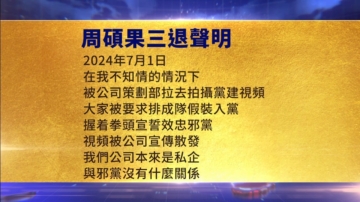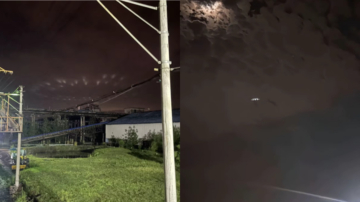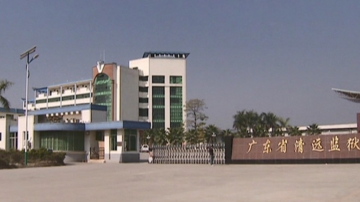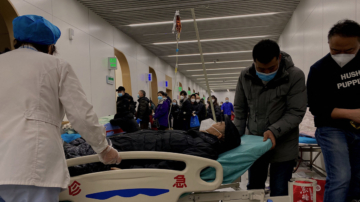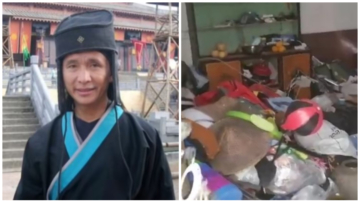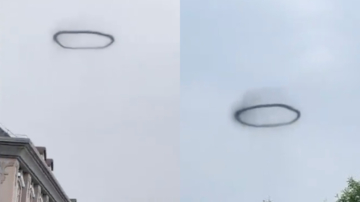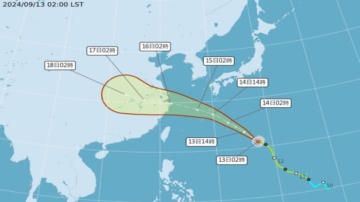【新唐人2014年06月26日訊】四年前,在德國斯圖加特市抗議的示威者遭到警方強制驅離,一些受傷的抗議者將警察告上法庭,其中,針對批准警方使用高壓水槍行動的負責人案件於日前開庭,兩名負責人被控過失犯罪。分析人士指出,相較於德國,中國大陸在中共的專政下,法律形同虛設,甚至「公檢法一家」,暴力執法的警察很少被追究。
2010年9月30號,德國一名退休人員瓦格納(Dietrich Wagner)在斯圖加特市御花園,對有爭議性的火車站改建項目表示抗議,警察使用高壓水槍對付他,導致69歲的他幾近失明。
瓦格納的律師弗蘭克•烏爾裡希•曼(Frank Ulrich Mann)向《德國之聲》表示,他的當事人親眼看到,警察如何向兒童噴灑胡椒水,並使用高壓水槍瞄準示威者的頭部,他的當事人要求將責任人繩之以法。
目前有四名警察接到處罰令。6月24號,針對兩名警方行動負責人的案件開庭,他們因批准使用高壓水槍,被控過失犯罪。
時事評論員汪北稷:「民主國家的警察處理群體事件示威抗議,有它的執法的權力跟範圍,但是不管怎麼樣,不能過分的使用暴力,對比中國大陸的警察,在過去許多年的維權事件、集體事件當中,動輒使用暴力,或者抓進去以後使用酷刑,這個和中國大陸的法治的完全失控是很有關係的,中國大陸的法律是形同虛設。」
據了解,浙江杭州市餘杭區中泰鄉的村民,為了抵制在當地興建亞洲最大的垃圾焚化爐,5月10號下午,近3萬村民走上「杭徽高速公路」抗議,遭到杭州警方暴力鎮壓,兩村民被打死,一名小孩被摔死,數十人受傷被送往醫院搶救。
5月11號,餘杭區法院、檢察院、公安分局與司法局聯合發佈所謂「重要播報」,要求所謂的犯罪行為人主動投案,否則依法嚴懲,併發放15名犯罪嫌疑人的照片。
中國大陸律師唐吉田:「在民主國家,警察權的使用是有嚴格的程序,有非常具體的規定,像中國大陸,可以說到目前為止,由於制約和監督機制缺乏或者是不起作用,警察權的擴張、濫用對社會造成損害的情形時有發生,雖然也有一些規定對他們進行處理,但是由於一些行為是長官意志造成的,實際上相當多的責任沒有追究,很多人也就認為,只要有頭頭撐腰,不必有甚麼顧忌。」
3月30號,廣東茂名市民開始走上街頭,抗議興建具有危害性的「對二甲苯」(PX)化工廠。當局出動大批警力暴力鎮壓。有15人死亡、數百人受傷。
4月23號,茂名市警方宣稱,已刑事拘留24人,檢察機關批准執行逮捕5人﹔行政處罰36人,其中送社區戒毒2人。
廣州市白雲區原派出所副所長陳軍育:「警察他是沒人管的,公檢法都是一家的,司法又不獨立,新聞媒體也不是獨立的,所以他們就是倚仗著這一點耍賴,沒有人追究,有恃無恐。」
前《陜西電視臺》編輯馬曉明透露,去年3月8號,他遭到警方非法抓捕,並被毆打。警察還向他唸毛澤東語錄,他認為,警察暴力執法的根源,在於毛澤東開創的專制體制被沿用下來。
前陜西電視臺編輯馬曉明:「警察在毛澤東已經去世30幾年的情況下,還居然拿毛澤東的語錄作為依據,來對我進行違法的抓捕和審問,這就說明,雖然文化革命以後,對毛澤東所謂的功過進行了評定,但是毛澤東的巨大罪過,對歷史巨大的破壞,沒有得到徹底清算,它開創的專制體制沿用下來了,這就是中共的統治下,警察非法的暴力頻頻發生的最根本的原因。」
時事評論員汪北稷指出,中共靠暴力革命起家,中共從高層到基層,都沒有放棄使用暴力來解決問題。目前在中國大陸,很多民眾在無路可走的情況下,也選擇使用暴力來反抗中共的統治。
採訪/陳漢 編輯/陳潔 後製/陳建銘
German Police Tried For Violence, What About Chinese Police Brutality?
Four years ago, demonstrators were injured when
a Stuttgart, Germany protest was dispersed by police.
Later, the protesters sued police.
The court case against the responsible officers
recently went to trial.
Two officers were accused of negligence.
Analysts say that China's law, under the Chinese Communist
Party's (CCP) rule, is useless compared with Germany's.
The Public Security, the Procuratorate and the Court shield
each other, and violent police are rarely brought to justice.
On Sept. 30, 2010, German retiree Dietrich Wagner was
protesting a controversial train station reconstruction plan.
Police used a water cannon to strike him in the face,
nearly blinding the 69-year-old.
Wagner's lawyer Frank Ulrich Mann
was interviewed by Deutsche Welle.
He said that his client witnessed pepper spray
being used on children.
Police also targeted the heads of protesters
with water cannons.
Mann says that his client sought justice.
So far, an order of summary punishment has been filed
against four police officers.
On June 24, two officers responsible for the use of water
cannons were tried and accused of negligence.
Wang Beiji, current affairs commentator: "Police in
democratic countries have their limitations
in handling protests.
The police cannot use excessive violence.
In China, for many years, police frequently use violence
to handle protesters, or torture protesters after detainin"
Sources say that on May 10 villagers in Hangzhou, Zhejiang
protested against a planned waste incinerator.
Nearly 30,0000 villagers protested on a motorway.
Police dispatched to the site violently suppressed protesters.
Two villagers and one child were killed.
Dozens injured were rushed to hospital.
On May 11, the local police, the court and the Procuratorate
jointly issued a notice demanding alleged criminals
to voluntarily surrender, otherwise, severe punishment
would apply.
Meanwhile, photos of 15 "suspects" were published.
China-based lawyer Tang Jitian: "In a democratic country,
there are strict and detailed police procedures.
In China, supervision institutions don't play their role.
Police have expansive power and often casually abuse
their rights, damaging society – this is a frequent occurrence.
Although some regulations are in place to deal with them,
some actions were ordered by their superiors,
so the majority haven't been punished.
Many people believe that as long as their superiors
shield them, there is no need to worry."
On March 30, citizens of Maoming, Guangdong protested
against plans for a chemical plant (PX).
Police were dispatched en masse to the site
where they violently suppressed demonstrators.
15 protesters were killed and hundreds were injured.
On April 23, Maoming police claimed that 24 people
were detained and five were placed under arrest.
Of 36 people given fines, two were sent
to drug addiction treatment centers.
Chen Junyu, former deputy director of Baiyun District,
Guangzhou City: "Police are above the law.
The Public Security, the Court and
the Procuratorate cover each other.
The Judiciary and media are not independent,
thus police exploit loopholes.
Nobody punishes them, so they don't care."
Ma Xiaoming, former Shaanxi TV editor, reveals that he
was illegally arrested and beaten by police on March 8, 2013.
The police read Mao Zedong quotes to him.
Ma believes the cause of the police brutality
is due to Mao's tyrannical system being kept.
Ma Xiaoming: "Mao died over 30 years ago, but the police
quote his words as reasoning to illegally arrest and try us.
This indicates that after the Cultural Revolution,
although Mao was re-assessed, his huge sins
and the historical damage he caused have never been judged.
Mao's remaining tyrannical system
is the leading cause of police violence."
Wang Beiji says the CCP relied on violence to seize power.
It has never abandoned violence as a means
to resolve problems.
Now in Mainland China, many citizens have no other choice
but to use violence to resist the CCP's rule.
Interview/Chen Han Edit/Chen Jie Post-Production/Chen Jianming
2010年9月30號,德國一名退休人員瓦格納(Dietrich Wagner)在斯圖加特市御花園,對有爭議性的火車站改建項目表示抗議,警察使用高壓水槍對付他,導致69歲的他幾近失明。
瓦格納的律師弗蘭克•烏爾裡希•曼(Frank Ulrich Mann)向《德國之聲》表示,他的當事人親眼看到,警察如何向兒童噴灑胡椒水,並使用高壓水槍瞄準示威者的頭部,他的當事人要求將責任人繩之以法。
目前有四名警察接到處罰令。6月24號,針對兩名警方行動負責人的案件開庭,他們因批准使用高壓水槍,被控過失犯罪。
時事評論員汪北稷:「民主國家的警察處理群體事件示威抗議,有它的執法的權力跟範圍,但是不管怎麼樣,不能過分的使用暴力,對比中國大陸的警察,在過去許多年的維權事件、集體事件當中,動輒使用暴力,或者抓進去以後使用酷刑,這個和中國大陸的法治的完全失控是很有關係的,中國大陸的法律是形同虛設。」
據了解,浙江杭州市餘杭區中泰鄉的村民,為了抵制在當地興建亞洲最大的垃圾焚化爐,5月10號下午,近3萬村民走上「杭徽高速公路」抗議,遭到杭州警方暴力鎮壓,兩村民被打死,一名小孩被摔死,數十人受傷被送往醫院搶救。
5月11號,餘杭區法院、檢察院、公安分局與司法局聯合發佈所謂「重要播報」,要求所謂的犯罪行為人主動投案,否則依法嚴懲,併發放15名犯罪嫌疑人的照片。
中國大陸律師唐吉田:「在民主國家,警察權的使用是有嚴格的程序,有非常具體的規定,像中國大陸,可以說到目前為止,由於制約和監督機制缺乏或者是不起作用,警察權的擴張、濫用對社會造成損害的情形時有發生,雖然也有一些規定對他們進行處理,但是由於一些行為是長官意志造成的,實際上相當多的責任沒有追究,很多人也就認為,只要有頭頭撐腰,不必有甚麼顧忌。」
3月30號,廣東茂名市民開始走上街頭,抗議興建具有危害性的「對二甲苯」(PX)化工廠。當局出動大批警力暴力鎮壓。有15人死亡、數百人受傷。
4月23號,茂名市警方宣稱,已刑事拘留24人,檢察機關批准執行逮捕5人﹔行政處罰36人,其中送社區戒毒2人。
廣州市白雲區原派出所副所長陳軍育:「警察他是沒人管的,公檢法都是一家的,司法又不獨立,新聞媒體也不是獨立的,所以他們就是倚仗著這一點耍賴,沒有人追究,有恃無恐。」
前《陜西電視臺》編輯馬曉明透露,去年3月8號,他遭到警方非法抓捕,並被毆打。警察還向他唸毛澤東語錄,他認為,警察暴力執法的根源,在於毛澤東開創的專制體制被沿用下來。
前陜西電視臺編輯馬曉明:「警察在毛澤東已經去世30幾年的情況下,還居然拿毛澤東的語錄作為依據,來對我進行違法的抓捕和審問,這就說明,雖然文化革命以後,對毛澤東所謂的功過進行了評定,但是毛澤東的巨大罪過,對歷史巨大的破壞,沒有得到徹底清算,它開創的專制體制沿用下來了,這就是中共的統治下,警察非法的暴力頻頻發生的最根本的原因。」
時事評論員汪北稷指出,中共靠暴力革命起家,中共從高層到基層,都沒有放棄使用暴力來解決問題。目前在中國大陸,很多民眾在無路可走的情況下,也選擇使用暴力來反抗中共的統治。
採訪/陳漢 編輯/陳潔 後製/陳建銘
German Police Tried For Violence, What About Chinese Police Brutality?
Four years ago, demonstrators were injured when
a Stuttgart, Germany protest was dispersed by police.
Later, the protesters sued police.
The court case against the responsible officers
recently went to trial.
Two officers were accused of negligence.
Analysts say that China's law, under the Chinese Communist
Party's (CCP) rule, is useless compared with Germany's.
The Public Security, the Procuratorate and the Court shield
each other, and violent police are rarely brought to justice.
On Sept. 30, 2010, German retiree Dietrich Wagner was
protesting a controversial train station reconstruction plan.
Police used a water cannon to strike him in the face,
nearly blinding the 69-year-old.
Wagner's lawyer Frank Ulrich Mann
was interviewed by Deutsche Welle.
He said that his client witnessed pepper spray
being used on children.
Police also targeted the heads of protesters
with water cannons.
Mann says that his client sought justice.
So far, an order of summary punishment has been filed
against four police officers.
On June 24, two officers responsible for the use of water
cannons were tried and accused of negligence.
Wang Beiji, current affairs commentator: "Police in
democratic countries have their limitations
in handling protests.
The police cannot use excessive violence.
In China, for many years, police frequently use violence
to handle protesters, or torture protesters after detainin"
Sources say that on May 10 villagers in Hangzhou, Zhejiang
protested against a planned waste incinerator.
Nearly 30,0000 villagers protested on a motorway.
Police dispatched to the site violently suppressed protesters.
Two villagers and one child were killed.
Dozens injured were rushed to hospital.
On May 11, the local police, the court and the Procuratorate
jointly issued a notice demanding alleged criminals
to voluntarily surrender, otherwise, severe punishment
would apply.
Meanwhile, photos of 15 "suspects" were published.
China-based lawyer Tang Jitian: "In a democratic country,
there are strict and detailed police procedures.
In China, supervision institutions don't play their role.
Police have expansive power and often casually abuse
their rights, damaging society – this is a frequent occurrence.
Although some regulations are in place to deal with them,
some actions were ordered by their superiors,
so the majority haven't been punished.
Many people believe that as long as their superiors
shield them, there is no need to worry."
On March 30, citizens of Maoming, Guangdong protested
against plans for a chemical plant (PX).
Police were dispatched en masse to the site
where they violently suppressed demonstrators.
15 protesters were killed and hundreds were injured.
On April 23, Maoming police claimed that 24 people
were detained and five were placed under arrest.
Of 36 people given fines, two were sent
to drug addiction treatment centers.
Chen Junyu, former deputy director of Baiyun District,
Guangzhou City: "Police are above the law.
The Public Security, the Court and
the Procuratorate cover each other.
The Judiciary and media are not independent,
thus police exploit loopholes.
Nobody punishes them, so they don't care."
Ma Xiaoming, former Shaanxi TV editor, reveals that he
was illegally arrested and beaten by police on March 8, 2013.
The police read Mao Zedong quotes to him.
Ma believes the cause of the police brutality
is due to Mao's tyrannical system being kept.
Ma Xiaoming: "Mao died over 30 years ago, but the police
quote his words as reasoning to illegally arrest and try us.
This indicates that after the Cultural Revolution,
although Mao was re-assessed, his huge sins
and the historical damage he caused have never been judged.
Mao's remaining tyrannical system
is the leading cause of police violence."
Wang Beiji says the CCP relied on violence to seize power.
It has never abandoned violence as a means
to resolve problems.
Now in Mainland China, many citizens have no other choice
but to use violence to resist the CCP's rule.
Interview/Chen Han Edit/Chen Jie Post-Production/Chen Jianming


